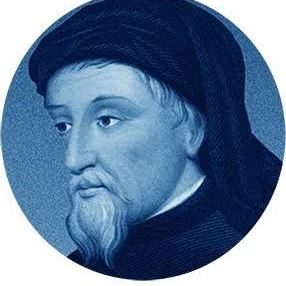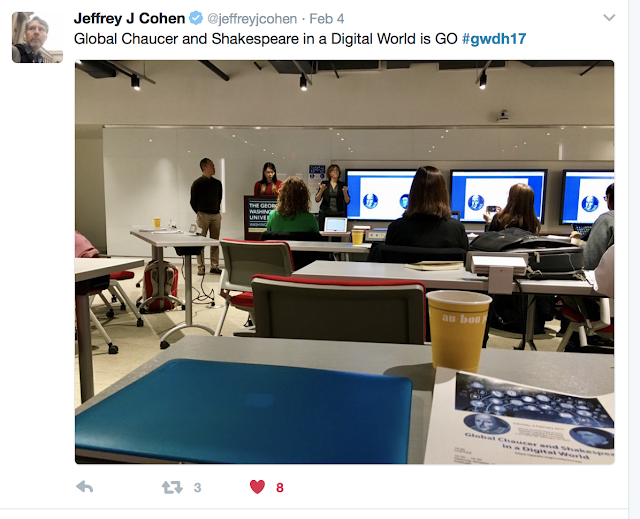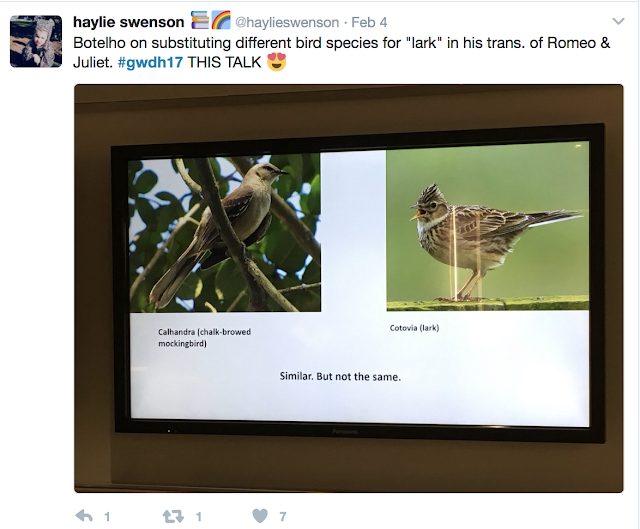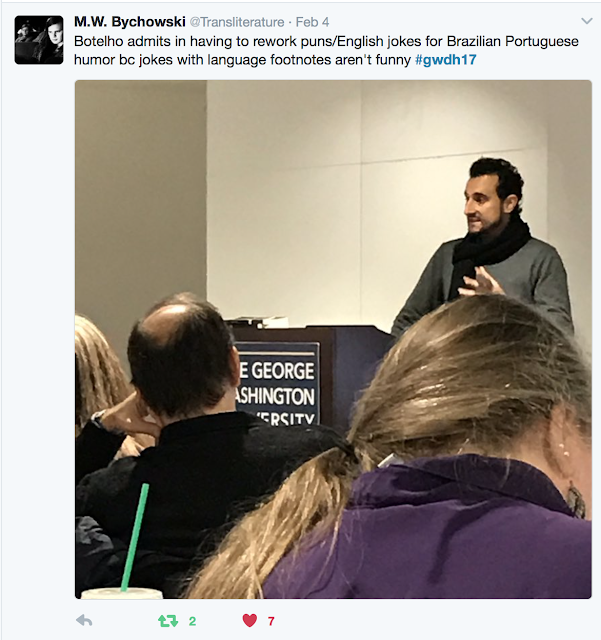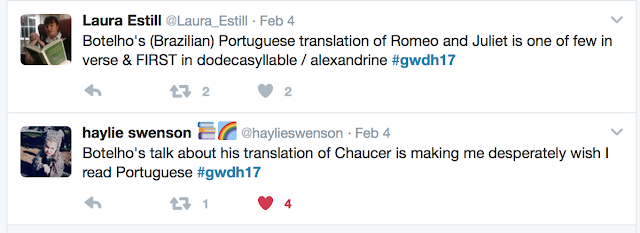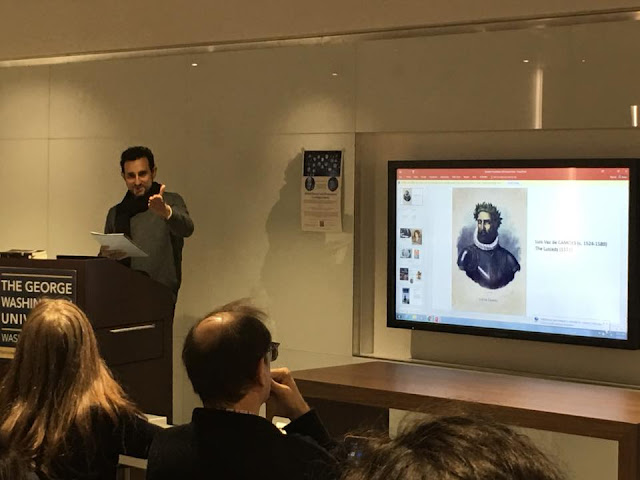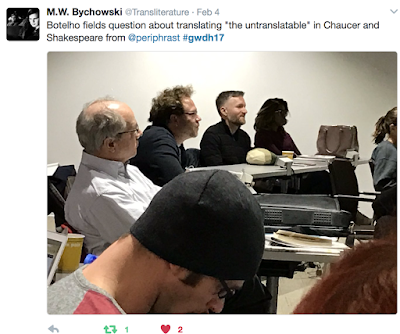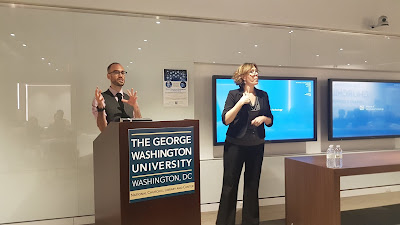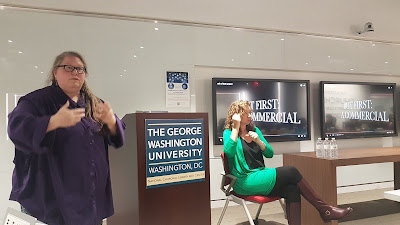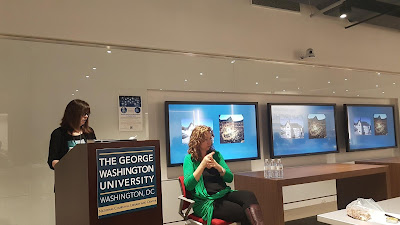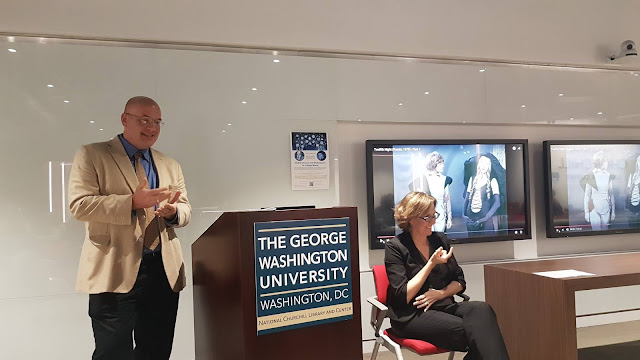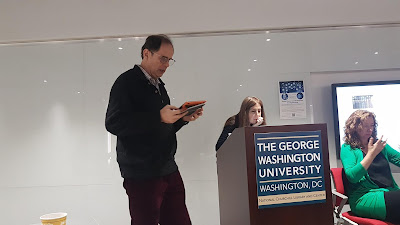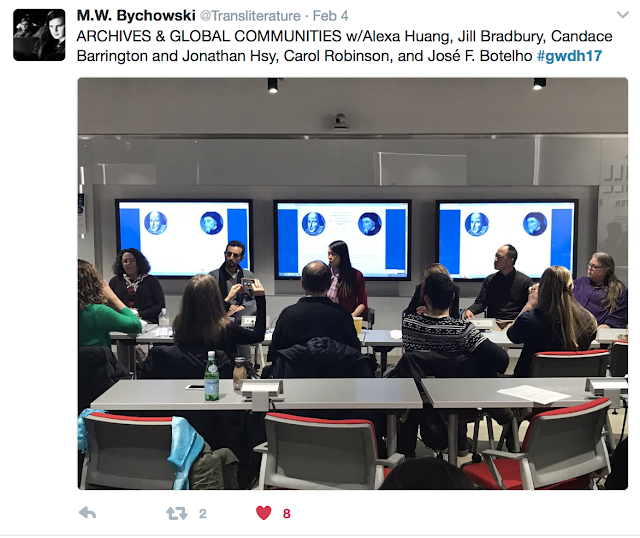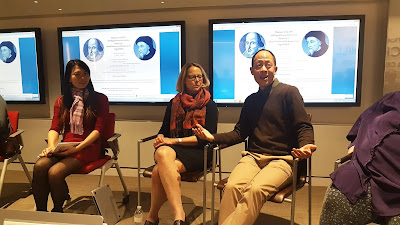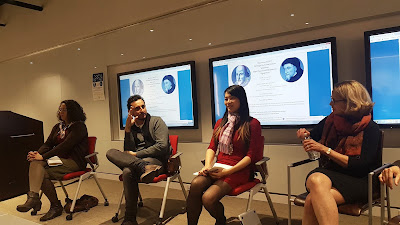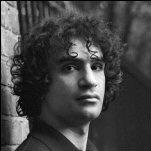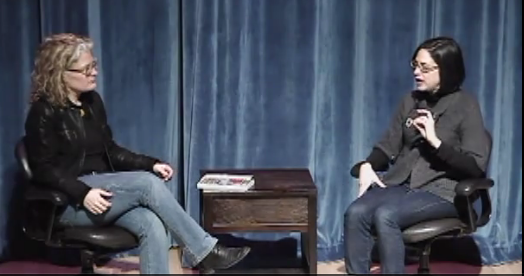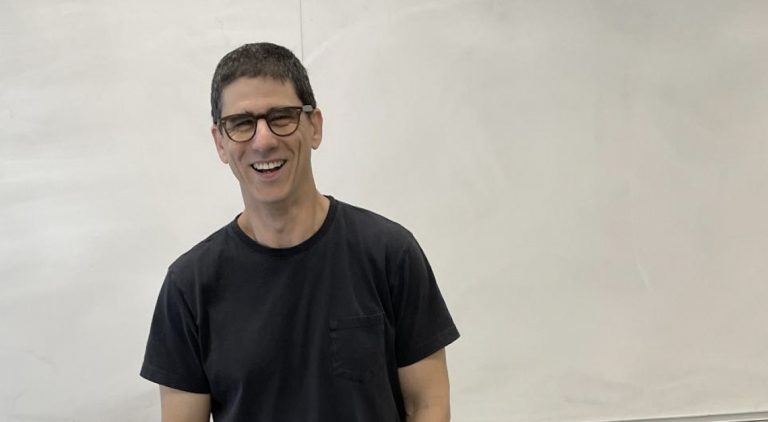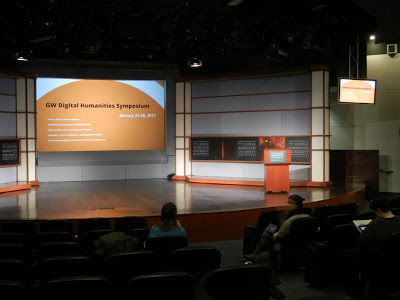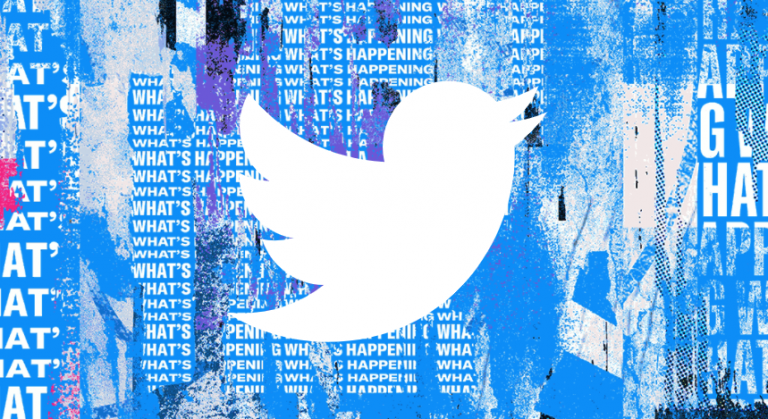On Saturday, February 4th 2017, scholars, professors, and students from a wide range of disciplines came together within the newly renovated walls of The National Churchill Library & Center within The George Washington University’s Gelman Library to attend the
GW Digital Humanities Institute’s 2017 Symposium:
Global Chaucer and Shakespeare in a Digital World
“Chaucer and Shakespeare, the global literary icons, play a major role in the digital world. This cross-disciplinary symposium puts the legacies of Chaucer and Shakespeare in conversation with each other. Speakers will explore the intersections and connections between the afterlives of Chaucer and Shakespeare in world cultures.”
The social media engagement provided commentary ranging from playful to profound:
The symposium commenced with opening remarks by Alexa Alice Joubin and Jonathan Hsy, the Co-Directors of the GW Digital Humanities Institute.
Their introduction covered two main points of interest:” 1.“Digital Hospitality,” outlining basic principles of archive and database creation that has been integral to how Global Chaucers (an international collective of scholars, translators, and enthusiasts) has developed and the shape it has taken. 2. “Linguistic and Cultural Hospitality,” a process of learning by engaging comparative translations as well as modern-day adaptations and performances of a dominant culture’s canonical text (i.e.,The Canterbury Tales). We use these key terms to explore both a theory and practice of digital curation: a form of knowledge building that is simultaneously an act of artistic creation.”
 Featured Speaker:
José Francisco Botelho, award-winning
translator and poet
Featured Speaker:
José Francisco Botelho, award-winning
translator and poet
(Universidade Federal do Rio Grande do Sul, Brazil)
“Of pilgrims, knights and cantadores: translating Chaucer and Shakespeare in modern Brazil”
Moderator: Candace Barrington
José Francisco Botelho is an award-winning writer and translator, currently doing his PhD thesis at Universidade Federal do Rio Grande do Sul – Porto Alegre, Brazil. His translations of “The Canterbury Tales” and “Romeo and Juliet” were published by Companhia das Letras in association with Penguin Books.
Abstract:
Brazil has a long and rich translation tradition: the rendering of Latin liturgy into Tupi and Guarany languages by jesuit missionaries; the creation of a “Brazilian Aeneid” by XVIIIth century poet and scholar Odorico Mendes; Haroldo de Campos’ celebrated translation theories; Mamede Mustafa Jarouche’s rendering of the One Thousand and One Nights; Machado de Assis’ and Monteiro Lobato’s several incursions into English and American prose and verse – all those translatorial odisseys are deeply ingrained into Brazilian thought and culture. South America’s only Portuguese-speaking country has also a long tradition of popular poetry, from the orally transmitted “rimances”, whose roots stretch to Medieval Portugal and Spain, to present-day minstrels and improvisators known as “cantadores”, “pajadores”or “repentistas”. In my endeavours as a poet and translator, I delved deeply into those sources to recreate Chaucer’s and Shakespeare’s poetry – a world-building enterprise whose aim is to shape fictional and linguistic universes that can appeal to modern Brazilian readers and audiences, blending the scholarly and the popular, the foreign and the local, the strange and the familiar.
As Botelho presented, audience members provided keen insight and archived notable moments in real time on twitter, using the official symposium hashtag #GWDH17
“José Francisco Botelho‘s brilliant presentation on how Chaucer’s “horsely horse” inspired him to translate the Canterbury Tales into Brazilian Portuguese (chair: Candace Barrington). His goal is not to “subdue Chaucer’s medieval strangeness but to create a hybrid medievalism through Romeo and Juliet as well as the Tales.”
Professor Daniel Dewispelare asked a followup question about untranslatability as a philosophical concept in response to Botelho’s comment about certain aspects of Chaucer’s work being “untranslatable.” On further review, Botelho expressed his sentiment that nothing is, in fact, truly impossible to translate.
After the keynote address, the 1st Paper session began:
MEDIA AND TRANSFORMATION,
moderated by PhD Student Sam Yates.
The paper session commenced with Carol Robinson, who presented a paper entitled:
“Shakespeare and Chaucer in the Deaf World: Transcriptions & Interpretations”
Abstract:
As the recent Visual Shakespeare’s Symposium held at Gallaudet University demonstrated, there has been a great fascination with ways to adapt Shakespeare’s plays into ASL. The challenge of translating sound-based wit and other humor, the challnge of adapting Shakespeare’s rich figurative language in such a way as to convey that richness through ASL poetics–these are just two examples of what has attracted interpreters and actors. Likewise, as is true for medieval scholars teaching less accessible medieval English works, the challenge of translating accurately, to the point of nearly killing the artistic qualities of the work, vs. the challenge of adapting in order to illustrate the art, at the cost of losing meaning, is certainly emphasized by the work of Deaf scholars in teaching anything from English (or other hearing-based languages) in a sign language. Hampered by cultural imperialism (the hearing over the deaf) and the audistic abuses upheld as “good practice” by members of both education and medical communities for the past recent centuries, it has been difficult (at best) for scholarly members of the Deaf community to be heard by their hearing colleagues. This is a great loss for all. Deaf students of English literature, including the works of Geoffrey Chaucer and William Shakespeare, demonstrate the cultural and semiotic barriers between those addicted to sound and those who live virtually sound-free lives.
Alexa Alice Joubin noted some points of interest on “Shakespeare, Chaucer, the “dumb” show (in both senses of the word), and the deaf world; Katherine Williams on the concept of “eunuch” (castrated boy AND a musical instrument) in Twelfth Night and Sulayman Al Bassam’s Speaker’s Progress. “The past always requires blood donors. Theatre is a form of transfusion.”
 Katherine Schaap Williams presented
Katherine Schaap Williams presented “Formal Capacities: The Speaker’s Progress Playing Twelfth Night”
Abstract:
My paper considers how the contemporary productions that we study under the rubric of Global Shakespeare can offer new lenses into familiar Shakespearean texts, not only by producing new interpretations of a play, but by asking us to rethink the possibilities of dramatic form. Reading Sulayman Al-Bassam’s 2011 play The Speaker’s Progress, the final part of his Arab Shakespeare Trilogy, alongside the source it partially replays, Shakespeare’s Twelfth Night, my paper traces the formal resonances between the texts. I argue that the acts of improvisation that drive Twelfth Night allow The Speaker’s Progressto theorize the political stakes of the theater—and allow The Speaker’s Progress to critique Twelfth Night’s fantasy of performance, a fantasy that persists as the idea of a reproduction free from the glitchiness of digital and theatrical technologies. While critical work on adaptations of Shakespeare’s plays in the Arab world has often framed their significance in terms of political topicality, I am interested in how Al-Bassam’s play thinks about the politics of the theater, and the consequences of such a claim for work in Global Shakespeare.
The first paper session closed with Eve Salisbury’s “Gower, Pericles, and Global Performance”
Eve Salisbury on how global performances of Gower in Pericles find habitat through heterotopic convergence where moments of birth and death are conflated to show the power of Gower as a great story teller.
Abstract:
In arguably one of the most famous lines in the Shakespearean canon, “All the world’s a stage,” introduces a recitation of the Seven Ages of Man (spoken by Jaques in As You Like It) from toothless beginning to toothless end. That the line was also thought to have been the motto ascribed to Shakespeare’s Globe suggests the recognition of the integral relation between lived reality and theatrical enactment. My reading of Gower’s role in Shakespeare’s Periclesconsiders the poet to be neither a stationary nor static chorus figure as depicted on the title page of George Wilkins’ novel, The Painefull Adventures of Pericles, Prince of Tyre, but rather an audible fulcrum between the past and the present, between life and death, between one culture and another, and between genders. Over time and successive performances of Pericles in various venues around the world, the blind and aging poet becomes a cipher of change to be played in ways that reach well beyond the Globe’s stage. Transformed by people of other cultures, ethnicities, and genders Gower becomes a living entity whose presence signifies neither the death of the past nor the death of the author, but rather a living dramatization of something new for both.
After a question and answer session, symposium participants broke for lunch. The symposium attendees were treated to an entertaining intermission show by Michael Saenger, whose spot- on impressions brought to life “Snape vs Branagh: From Shakespeare to Milton””
Michael Saenger and his intermission show: “Snape and Branagh: From Shakespeare to Milton”! Brilliant impersonation. Bravo!
Following this entertaining interlude, the 2nd Paper session,
ETHICS AND NETWORKS,
moderated by Mike Shea,
was comprised of the following presentations:
 Laura Estill: “What’s in and What’s Out: The Ethics of Digital Publication, Shakespeare Studies, and the World Shakespeare Bibliography Online”
Laura Estill: “What’s in and What’s Out: The Ethics of Digital Publication, Shakespeare Studies, and the World Shakespeare Bibliography Online”
The World Shakespeare Bibliography Online (WSB) offers users the tantalizing perception that they are searching the complete archive of translations, editions, scholarship, and professional performances of Shakespeare from 1960-present. As the saying goes, however, there is no such thing as a complete bibliography; the illusion of searching “all” leads to materials that are not just overlooked, but never able to be looked at in the first place. These “Archival silences” (to use Alexa Alice Joubin’s term) can be the consequence of redaction or now-lost information, but they can also result from lack of access and findability. Some of the most deafening silences, to use an oxymoron, in the archive of Shakespeare studies has been work by non-Western and non-English scholars; improved bibliography and access to publication is one of the ways to facilitate a truly global approach to Shakespeare.
This presentation discusses the scope and inclusion policy of the World Shakespeare Bibliography Online, with attention to digital publication, predatory journals, and varying standards of peer review. Ultimately, the question of “What’s In and What’s Out” of the WSB is a matter of both practicality and values. The World Shakespeare Bibliography reflects not just trends in Shakespeare studies, but also our culturally-bound scholarly, bibliographical, and editorial practices.
Laura Estill on the ethics of curation and archiving with the case study of World Shakespeare Bibliography
Mercedes de la Torre and Carlos Drocchi: “Shakespeare in other words: Fundación Shakespeare Argentina”
on the challenges of maintaining sustainable digital archives
Abstract:
The Fundación Shakespeare Argentina (FSA) is a non-profit cultural organization dedicated to increasing and deepening the knowledge, study and enjoyment of the works of William Shakespeare in Argentina. Since its inception in May 2011 the FSA has developed a Website where visitors from all over the world can discover Shakespeare through the works of Argentine authors and artists and may share those from international experts, get acquainted with local events, new releases, translations, movies, interviews etc. FSA also fosters international recognition of Argentinian interpretations and studies on Shakespeare’s works. It aims to spread and encourage Shakespeare studies through the interaction of academics, dramatists, artists and enthusiasts, creating a forum for national interchange with international projection. The presentation will include the most relevant projects, challenges and the edition of “Two illustrious lunatics”, a volume dedicated to honor Shakespeare & Cervantes´s 400 Anniversary.
Michael Saenger: “The Foreign Words and Other Worlds of Twelfth Night”
Abstract:
In his foundational essay on the theory of translations, Über Die Verschiedenen Methoden Des Übersetzens, Friedrich Schleiermacher writes “Just as it is perhaps only through the cultivation of foreign plant life that our soil has become richer and more fertile…our language…can most vigorously flourish and develop its own strength only through extensive contact with the foreign”. By explicitly linking the transfer of plants with the transplantation of culture, Schleiermacher points to the utility of thinking in both biological and in cultural ways about languages and nations, and the degree to which they exclude or invite cross-fertilization. I argue that the modern portability of Shakespearean performance can be linked to the original porosity of Shakespeare’s sense of place.
Of particular interest for this presentation is a 1978 Soviet film of Twelfth Night (dir. Peter James), integrating elements of ballet and postmodern theater practice. As a balletic adaptation of a play deeply engaged in social class, the film offers an intriguing perspective on Moscow’s importation of this festive play. I will explore how and why the life of Shakespeare’s play can both invite foreign vocabulary and become foreign vocabulary itself. The recent recognition that language and culture more generally follow patterns that can be understood in biological terms, rather than the familiar modes of influence and commodity circulation, implies that literary historiography and anatopical performance can function (and have functioned in the past) as sites of resistance to the emerging politics of nationalism and xenophobia.
Michael Saenger demonstrating how Shakespeare, like plants, thrives through foreign contact, with a case study of a Russian operatic Twelfth Night.
After a final break for coffee and refreshments, symposium presenters including Jill Bradbury, Candace Barrington and Jonathan Hsy (Co-Directors of Global Chaucers), Carol Robinson, and José Francisco Botelho assembled at the front of the room for the final session of the day:
ARCHIVES AND GLOBAL COMMUNITIES
Roundtable, moderated by Alexa Alice Joubin
“Our remarks address two concepts: 1. “Digital Hospitality,” outlining basic principles of archive and database creation that has been integral to how Global Chaucers (an international collective of scholars, translators, and enthusiasts) has developed and the shape it has taken. 2. “Linguistic and Cultural Hospitality,” a process of learning by engaging comparative translations as well as modern-day adaptations and performances of a dominant culture’s canonical text (i.e.,The Canterbury Tales). We use these key terms to explore both a theory and practice of digital curation: a form of knowledge building that is simultaneously an act of artistic creation.”
Panelists created a synergistic and engaging dialogue between their intersectional yet notably distinct fields of study and work, and fielded questions such as how to parse apart the distinction between an adaptation and a translation and how to function as the arbiter of what is worth archiving versus what is not, spanning from tweets to high school plays on YouTube, as well as the ethics of archiving and disseminating performances that could be categorized as intellectual property. Emily Lathrop, a PhD student specializing in Shakespearean studies, rounded out the discussion with a thoughtful and well-crafted query: “Is there a place for social media performances in global archives? Does this mode of interaction with and performance of Shakespeare call for its own specific archive? How does an archivist decide what constitutes saving?”
Following the roundtable, participants and attendees alike joined for one last, and much needed, coffee break, and as the symposium drew to a close, it was clear that this was simply the beginning of a long lasting and generative dialogue that will most certainly emerge from the intersection of such brilliant writers and thinkers.
 Featured Speaker:
Featured Speaker:  Laura Estill: “What’s in and What’s Out: The Ethics of Digital Publication, Shakespeare Studies, and the World Shakespeare Bibliography Online”
Laura Estill: “What’s in and What’s Out: The Ethics of Digital Publication, Shakespeare Studies, and the World Shakespeare Bibliography Online”
